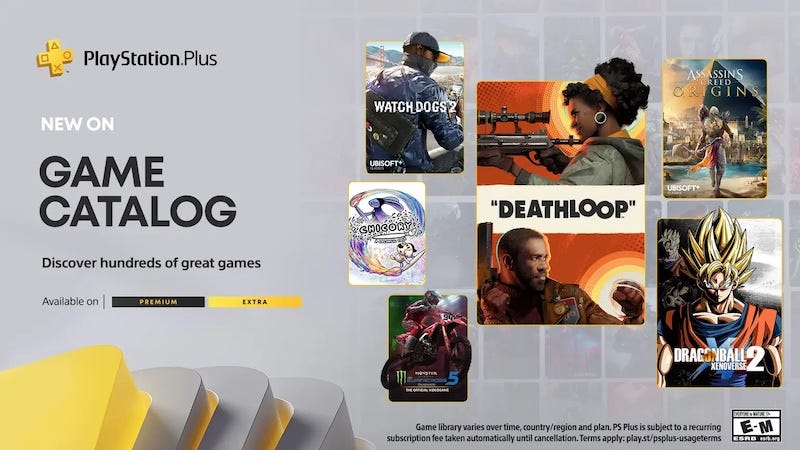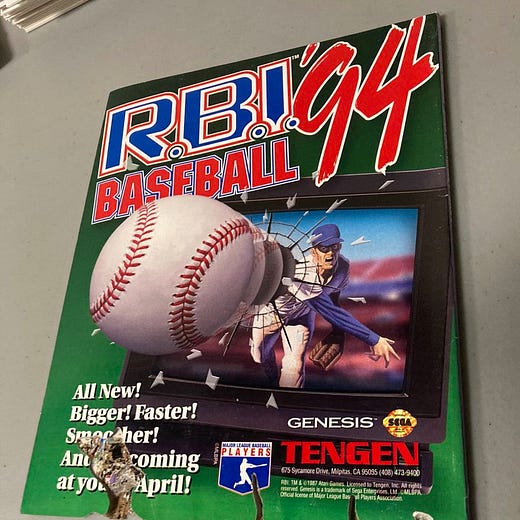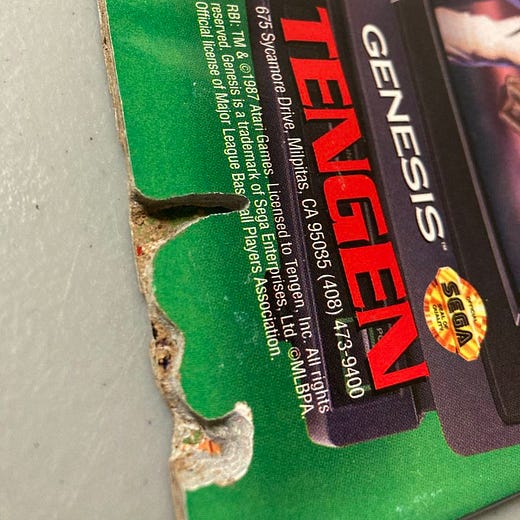Nature or nurture? The biggest game discovery question..
Also: some neat Switch data, follow-ups, platform news, and more.
[The GameDiscoverCo game discovery newsletter is written by ‘how people find your game’ expert & company founder Simon Carless, and is a regular look at how people discover and buy video games in the 2020s.]
Welcome back, folks, to the show that never ends, the ‘It’s A Small World’ of the game biz, the GameDiscoverCo newsletter. As per normal, we hit you up two (or three) times a week with meaty analysis and news round-ups - whether you like it or not.
And yes, sure, less than a week left on that Plus paid sub offer - 30% off for the first year. Perks? That Friday weekly ‘which games are big and why?’ game trend analysis newsletter, interactive Steam ‘Hype’ charts, eBooks, Discord access & more…
Nature, or nurture? Revisiting Dinkum’s success…

So, you may remember we did a whole newsletter on Dinkum’s success a couple of weeks back. (Recap: solo dev, long development time, ‘formal’ marketing only at the end of the project, still a smash hit, with 350k Steam units sold in the first month!)
One of our main conclusion points was: “it’s not always about perfect marketing execution, it’s about ‘right vibes, right game, right time’.” So maybe it’s not surprising that we got contacted by Michal Napora from game marketing agency 32-33, a smart marketer I’ve chatted to before. He led the late-stage marketing for Dinkum.
Michal is a reader of this newsletter. So for him, getting this email about a hit game he worked on - which could be implied to read ‘the game was going to be successful whatever’ - was a slap in the face re: the hard work he’d done leading up to launch.
I do - and did - think about how all you marketers reading this newsletter might take the implied message that you’re not important to the success of the game. And obviously, it’s more nuanced than that. So let’s try to unpack it:
In the original piece, I did clearly say that Dinkum’s formal marketing started late, and featuring in IGN’s Summer Of Games & Future Games Show, plus some pre-release YouTube/Twitch streamer outreach meant “the game’s wishlists were around 35,000 before those pre-release bumps, but around 80,000 at launch.” In other words, it did matter.
But for me, being a marketer for a game is like you’re a parent raising your kids. If you’re not familiar with the ‘nature vs. nurture’ concept in childrearing: “Nature is what people think of as pre-wiring and is influenced by genetic inheritance and other biological factors. Nurture is generally taken as the influence of external factors after conception e.g. the product of exposure, experience and learning on an individual.”
I would say that ‘nurture’, in game discovery, is the marketing process. And ‘nature’ is the genre and style of game being made. So yes, in recent decades, science has pointed to the fact that “parental upbringing seems to matter less than previously thought” - i.e. that the concept of the ‘blank slate’ espoused by John Watson and others isn’t accurate. I see the same happening in the game biz.
We definitely believe that the ‘nature’ - the genre, look, features, and gameplay mechanics of a game - is most important to its success. And we’re sometimes surprised by the relative lack of rigor and process that goes into deciding which games to make, and overall portfolio management and balancing. (Funnily enough, Chris Z’s latest ‘How To Market A Game’ post is about this - how using market data to decide which games to make isn’t bad.)
But this doesn’t mean, if you’re a marketing ‘parent’, that you should neglect the ‘game infants’ that have been handed to you. You can still nurture them with all you’ve got! It can sometimes be difficult to tell if the underlying ‘nature’ of the title is commercial, too. For example, games like Among Us were poised for success, but hadn’t found the right amplification method.
On that very subject, it’s clear to me that targeted influencer outreach was a key differentiator for Dinkum. Michal & friends looked at wholesome-centric streamers and he pointed me to a TagBackTV YouTube video as “a bit of a catalyst”, alongside Vixella on Twitch and, of course, Raptor’s coverage.
And if I was a marketer in today’s business, I would be trying to ask myself - with apologies for continuing to mix a metaphor poorly - how do I get more adorable babies? What data or insight can you bring earlier in the dev or pre-signing process to help your company pick the right game genre or features? Then you can inherit a smiling, gorgeous infant to raise to greatness, as happened with Dinkum.
And, in talking to Michal, he did agree: “No matter how perfect the marketing… it all has to work in unison - the product and the promotion. And hitting collective gamers' consciousness with the right product at the right moment.. is crucial.” Kids, huh?
Switch first-party game sales - intriguing new data

Over in Japan, the latest CESA (Computer Entertainment Suppliers Association) White Book report is out, and as NintendoLife details out, it “provides updated worldwide sales data (including physical and digital sales) for Switch games as of 31st December 2021.”
You may recall that Nintendo owns a surprisingly large percentage of the software market on its own console, compared to Xbox and PlayStation. Most recently: “First party games made up almost 80% of the platform’s annual software sales [by $].”
So you can already see some of the evergreen Nintendo Switch first-party titles above - Mario Kart 8 selling another 1.5 million in just one quarter, and Animal Crossing shifting another 750,000. The platform exclusivity is concentrating sales onto just Switch, of course - but it’s super impressive.
However, what’s more interesting for us is this cut of the data, which is CESA’s full reported calendar 2021 sales for a range of ‘smaller’ first-party Nintendo Switch titles with >1 million LTD, including worldwide physical shipments & digital sales:

Don’t worry too much about the selection of games. It’s just interesting to see how many units some of these older games sell/ship in a year, worldwide. (Intriguing to see how Switch near-launch title ARMS is being overtaken by a lot of newer games…)
And if you remember that all Nintendo first party games combined are 80% of the market in $, and there are many less Nintendo games than non-Nintendo games? You can get a sense of how other games might do on the platform. Maybe. Vaguely. Kinda.
The game discovery news round-up..
OK, let’s finish this whole darn thing off by rockin’ a whole bunch of game discovery news and opinions, all in a row. And you can click on any of them you want:
A reminder: September 1st is the deadline to fix your Steam graphical capsules to not have ‘crud’ all over them, and: “Any game not adhering to these rules may have limits to visibility within the Steam store and will be ineligible for featuring in official Steam sales and events.” So it might be worth doing!
Aha, PlayStation Plus’ ‘Game Catalog’ additions for September are here, and we would describe them as ‘bulked-up and interesting, tho still all older titles’: “Deathloop; AC Origins; Watch Dogs 2; DB Xenoverse 2; Spiritfarer; Chicory; Monster Energy Supercross 5; Alex Kidd in Miracle World DX; Rabbids Invasion; Rayman Legends; Scott Pilgrim vs the World The Game Complete Edition.” And a few ‘classic’ releases, including Sly Cooper PS3 games and Syphon Filter 2 on PS1.
Facebook’s Gaming app for iOS and Android “is shutting down a little over two years after it launched. In a notice sent to users, Facebook says the app will no longer work or be available to download starting on October 28th, 2022.” This is the ‘influencers x streaming’ platform that Mixer got absorbed into, but I guess it didn’t work out.
New games on subscription platforms: Apple Arcade’s September looks strong and includes Horizon Chase 2 and Shovel Knight Dig; Xbox’s ‘Games With Gold’ makes Portal 2 its final Xbox 360 title; Amazon’s Prime Gaming line-up for September has oodles of stuff (in-game items, free games, cloud games via Luna.)
Squanch Games’ ‘High On Life’, featuring an obnoxious talking gun with the voice of Rick & Morty’s Justin Roiland, was apparently one of the viral hits of Gamescom 2022 for IGN: “A week after Gamescom, on IGN channels alone, content about High on Life has seen over 24 million video views, and a staggering 56 million impressions… by comparison, Dune Awakening – the next most popular title we covered – saw just 8.6 million impressions.” Huh.
The Evolve Analytics crew have released a survey on Steam’s UTM tracking feature, partly conducted via a survey in this newsletter. The privacy-friendly tracking is very consumer-friendly, but devs don’t seem to love it: “57.2% were either somewhat, or very dissatisfied with Steam UTM, while only 20% were very or somewhat satisfied. Lastly, 22.9% remained neutral.”
Just after Paradox’s ‘sure to be a smash’ Victoria 3 started pre-orders for its October 25th release, the game - previously confirmed for PC Game Pass: “will [now] be a Steam exclusive at the release - after discussion with our partners it was decided that Victoria 3 won't be a part of Game Pass or Microsoft Store.” Was the PCGP cannibalization risk at launch too high, or is something else going on?
Microlinks: how level design saved a mobile hypercasual game with a 20% day one retention rate; European PlayStation players get more Platinum trophies than U.S. players; here’s an empirical study of 23,485 games on the Steam platform to analyze how often, and which games delayed their release date.
What are the top games on Steam Deck for the past month, sorted by total hours played? Looks like these gems: “Vampire Survivors; Cult Of The Lamb; Elden Ring; Spider-Man Remastered; Stardew Valley; No Man’s Sky; Hades; MultiVersus; Skyrim: Special Edition; Monster Hunter Rise.” Love Skyrim appearing in here - that game just will not die.
Wider-ranging microlinks: which social platforms did memes come from, from 2010 to 2022?; the passing of California’s new ‘kids code’ legislation may have ramifications for video games; critics and fans have never disagreed more about movies - somewhat less the case for games, maybe?
Finally, want to see what happens when paper-based video game history meets… tiny insects? My buddies at the Video Game History Foundation received this example last week, and I just had to take some pics and share:
[We’re GameDiscoverCo, an agency based around one simple issue: how do players find, buy and enjoy your premium PC or console game? We run the newsletter you’re reading, and provide consulting services for publishers, funds, and other smart game industry folks.]





